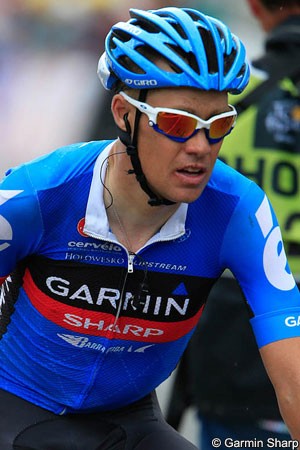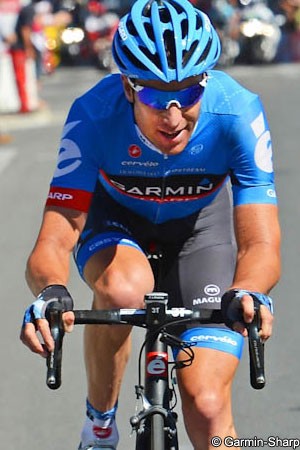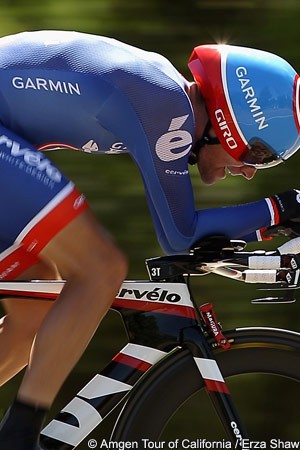Danielson, Vande Velde and Zabriskie admit past doping and commitment to clean racing at Slipstream Sports
 Of the eleven former teammates of Lance Armstrong named in today’s US Anti-Doping Agency (USADA) “reasoned decision” behind its application of a life ban for the Texan, and the stripping of his results since 1998, four are still active members of the peloton, and three of those are riders at Garmin-Sharp. Tom Danielson, Christian Vande Velde and Dave Zabriskie are all cited in USADA’s report as having admitted doping themselves while teammates of Armstrong’s, as well as witnessing Armstrong dope himself.
Of the eleven former teammates of Lance Armstrong named in today’s US Anti-Doping Agency (USADA) “reasoned decision” behind its application of a life ban for the Texan, and the stripping of his results since 1998, four are still active members of the peloton, and three of those are riders at Garmin-Sharp. Tom Danielson, Christian Vande Velde and Dave Zabriskie are all cited in USADA’s report as having admitted doping themselves while teammates of Armstrong’s, as well as witnessing Armstrong dope himself.
All three have issued statements, via the team, in which they acknowledge their former doping, while committing to clean cycling as riders for Slipstream Sports – the parent company for Garmin-Sharp – which was created by Jonathan Vaughters, who was also a witness in USADA’s report.
“I don’t remember a time when I didn’t want to be a professional cyclist,” Danielson’s statement begins. “It has always been my dream. Along the road to following my dream, I’ve had several ups and downs, but I stuck with it because I love the sport.”
While entering the peloton as a clean rider, Danielson then came to a crossroads – when he was on Armstrong’s US Postal team – where he was faced with the prospect of doping.
“…after years of doing things the right way, I was presented with a choice that to me, did not feel like a choice at all,” he writes. “In the environment that I was in, it felt like something I had to do in order to continue following my dream. I crossed the line and that is something I will always be sorry for. I accept responsibility for my choices and apologise to everyone in my life for them – in and out of the sport.”
 Vande Velde too writes of being a clean rider who was faced with a difficult decision: to dope, or to give up.
Vande Velde too writes of being a clean rider who was faced with a difficult decision: to dope, or to give up.
“…one day, I was presented with a choice that to me, at the time, seemed like the only way to continue to follow my dream at the highest level of the sport,” the 36-year-old writes. “I gave in and crossed the line, a decision that I deeply regret.”
The rider who finished fourth in the 2008 Tour de France in his first season with Slipstream does acknowledge however that, while he felt pressure to dope, the decision was his alone.
“I was wrong to think I didn’t have a choice – the fact is that I did, and I chose wrong,” he states. “I won races before doping and after doping. Ironically, I never won while doping, I was more or less just treading water. This does not make it ok. I saw the line and I crossed it, myself. I am deeply sorry for the decisions I made in the past – to my family, my fans, my peers, to the sport that I love and those in and out of it – I’m sorry. I always will be.”
Zabriskie, the youngest of the three riders, writes specifically of how he was pushed into doping after showing promise
“After distinguishing myself in an important race, management presented me with drugs and instructed me on how to proceed,” he writes. “I was devastated. I was shocked. I had never used drugs and never intended to. I questioned, I resisted, but in the end, I felt cornered and succumbed to the pressure.”
 He adds that, while he doped “in less than a handful of confined instances never making it a systematic part of my training practices or race routines.”
He adds that, while he doped “in less than a handful of confined instances never making it a systematic part of my training practices or race routines.”
All three riders credit their current team for allowing them to compete clean, with Slipstream Sports being created by Vaughters shortly after his own retirement to give riders the opportunity to compete without doping.
“We created Slipstream Sports because we wanted to create a team where cyclists could compete 100% clean,” says the team’s statement. “We understood cycling’s history and we were determined to create a different environment for riders; to give them a place to come where they did not have to make the difficult and heartbreaking choices of the past.
The organisation itself is standing firmly behind its riders after what has reportedly been their full co-operation with the USADA investigation.
“We support and believe in Christian, David and Tom one hundred percent,” the team statement concludes. “By coming forward and sharing their history, they have lived up to the promise that we as an organization made to the world when we founded Slipstream. We hope that fans and sponsors throughout the world can understand that despite the mistakes they made in their pasts, they are a critical part of the future. We hope you can believe, as we do, that this step, while painful, contributes to building a better future.
————————————-
Danielson’s, Vande Velde’s, Zabriskie’s and Slipstream Sports’ statements in full
TOM DANIELSON STATEMENT
I don’t remember a time when I didn’t want to be a professional cyclist. It
has always been my dream. Along the road to following my dream, I’ve had several ups and downs, but I stuck with it because I love the sport. I never set out thinking I would cross a line, I set out simply wanting to compete, to race my bike and do what I love. And that is exactly what I did, clean. Then, after years of doing things the right way, I was presented with a choice that to me, did not feel like a choice at all. In the environment that I was in, it felt like something I had to do in order to continue following my dream. I crossed the line and that is something I will always be sorry for. I accept responsibility for my choices and apologize to everyone in my life for them – in and out of the sport.
When I heard about the team Jonathan Vaughters was creating, I knew that his team was exactly what cycling needed – it was exactly what I needed and I wanted to be a part of it. Even though I made the choice to compete clean before Slipstream’s inception, I’ve seen both worlds, and I believe that today, cycling is in a good place, and that organizations like Slipstream have helped change the sport. I believe, too, that it’s time to confront cycling’s past, so that we can continue to build its future. That’s what I’ve done, and I promise it’s what I’ll continue to do.
CHRISTIAN VANDE VELDE STATEMENT
I love cycling, it is and always has been a huge part of who I am. As the son of a track cycling Olympian I was practically born on the bike and my dream, ever since I can remember, was always to be a professional cyclist. I have failed and I have succeeded in one of the most humbling sports in the world. And today is the most humbling moment of my life.
As a young pro rider I competed drug free, not winning but holding my own and achieving decent results. Then, one day, I was presented with a choice that to me, at the time, seemed like the only way to continue to follow my dream at the highest level of the sport. I gave in and crossed the line, a decision that I deeply regret. I was wrong to think I didn’t have a choice – the fact is that I did, and I chose wrong. I won races before doping and after doping. Ironically, I never won while doping, I was more or less just treading water. This does not make it ok. I saw the line and I crossed it, myself. I am deeply sorry for the decisions I made in the past – to my family, my fans, my peers, to the sport that I love and those in and out of it – I’m sorry. I always will be.
I decided to change what I was doing and started racing clean again well before Slipstream, but I chose to come to Slipstream because I believed in its unbending mission of clean sport. Today, I am proud of the steps that I and cycling have have made to improve the future of the sport that I love so much. I am proud to be a part of an organization that implemented a no-needle policy. I am proud that I published my blood values for all of the world to see after almost reaching the podium at the 2008 Tour de France; showing first and foremost myself that it was possible to and then, confirming it for the rest of the world. I continue to be proud of the strides the sport has taken to clean itself up, and the actions our organization has taken to help shape the sport that I love.
We’re in a good place now, young riders of the new generation have not had to face the choices that I did, and this needs to continue. By looking at the mistakes of cycling’s history, we have an opportunity to continue to shape its future.
I’m very sorry for the mistakes I made in my past and I know that forgiveness is a lot to ask for. I know that I have to earn it and I will try, every day, to deserve it – as I have, every day, since making the choice to compete clean. I will never give up on this sport, and I will never stop fighting for its future.
DAVID ZABRISKIE STATEMENT
Cycling was a refuge for me. Long, hard training rides were cathartic and provided an escape from the difficult home life associated with a parent with an addiction. My father had a long history of substance use and addiction. Seeing what happened to my father from his substance abuse, I vowed never to take drugs. I viewed cycling as a healthy and wholesome outlet that would keep me far away from a world I abhorred.
In 1996, soon after joining a local cycling club and winning a state championship, I qualified to participate in training at the U.S. Olympic Training Center. After winning the GP Des Nation under 23 category in 2000, I was invited onto a pro-level team. Ironically, the sport I had turned to for escaping drugs turned out to be rampant with doping. I chose not to focus on that. I was young, everyone was telling me I had a great future – and I knew I could do it clean. From the beginning, I always had.
After distinguishing myself in an important race, management presented me with drugs and instructed me on how to proceed. I was devastated. I was shocked. I had never used drugs and never intended to. I questioned, I resisted, but in the end, I felt cornered and succumbed to the pressure. After one week I stopped. I subsequently succumbed in less than a handful of confined instances never making it a systematic part of my training practices or race routines. But it happened and I couldn’t be sorrier. It was a violation – a violation not only of the code I was subject to, but my personal and moral compass that I had set out to follow. I accept full responsibility and was happy to come forward and tell USADA my whole story; I want to do my share to help bring this entire issue to the fore and ensure a safe, healthy, and clean future for cycling.
I returned to being 100% clean long before the Anti-Doping Commitment was issued for riders to sign in 2007. I was one of the first to sign. I embraced complete transparency. When Slipstream surfaced I was eager to join for all that it stands for and its unwavering commitment to clean cycling. I only wish a team like this had existed when I was a neo pro. Cycling started out as a refuge for me and I want to play my part in making it the sport I had always hoped it would be and know that it can be.
STATEMENT FROM SLIPSTREAM SPORTS
We created Slipstream Sports because we wanted to create a team where cyclists could compete 100% clean. We understood cycling’s history and we were determined to create a different environment for riders; to give them a place to come where they did not have to make the difficult and heartbreaking choices of the past. We built our organization based on the core values of honesty, fairness and optimism. We built it on the belief in our ability to contribute to changing the sport’s future through a persistent commitment to the present. We implemented the most progressive independent anti-doping system in all of professional sport and the first-ever no needle policy in professional cycling. We made anti-doping not just a strict policy and mission, but part of every conversation.
Today, we are very encouraged to see the incredible strides cycling has taken to clean itself up. But, while it is important to acknowledge pride in the fact that cycling has never been cleaner, we find ourselves at a critical moment in cycling’s evolution: confronting its history.
The founding concepts of Slipstream Sports were put in place for riders committed to competing clean during their time at Slipstream Sports. Every athlete who comes to us knows exactly who we are and what we stand for and when they come here, they make the choice to compete 100 percent clean.
While Christian, David and Tom made their mistakes the better part of a decade ago, they also made the choice to stop. To change what they were doing. To face the past, in their own way, and to start competing clean. In January 2008, they made another important choice – the choice to join our organization – because they believed in our mission and wanted a better future for the sport they love.
They have made another brave choice, to speak honestly and openly with the appropriate authorities, to confront their own pasts and cycling’s past and to accept the consequences, all in a continued effort to help the sport evolve.
Nothing can erase what has happened in cycling’s history, but we can learn from it. We can look back and say: never again. We can look forward to the crop of young athletes coming up not just on our team but on other teams and have confidence that the future of the sport is here.
Slipstream Sports, the small team that took to the Pro Tour ranks in 2008 with a huge anti-doping mission continues to help shape cycling’s future. We have consistently placed riders in the top ten of the Tour de France every year since our inception, clean. In 2011, we won Paris-Roubix, clean. We won our first Grand Tour in 2012, clean. We won the 2012 USA Pro Challenge, clean. But for Slipstream, its never been about winning. The real victory is showing the world that clean sport is a reality, and we are devoted to it. We firmly believe that these moments, and all the moments where we don’t win, but animate racing around the world, speak volumes about where the sport is today. Cycling has never been cleaner and we will work, every day, to help it continue to progress.
We support and believe in Christian, David and Tom one hundred percent. By coming forward and sharing their history, they have lived up to the promise that we as an organization made to the world when we founded Slipstream. We hope that fans and sponsors throughout the world can understand that despite the mistakes they made in their pasts, they are a critical part of the future. We hope you can believe, as we do, that this step, while painful, contributes to building a better future.